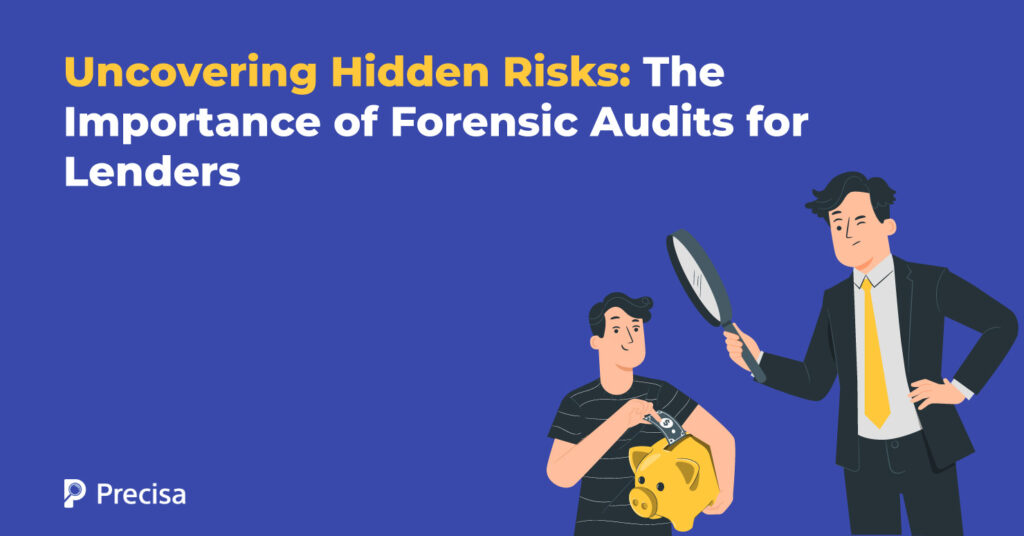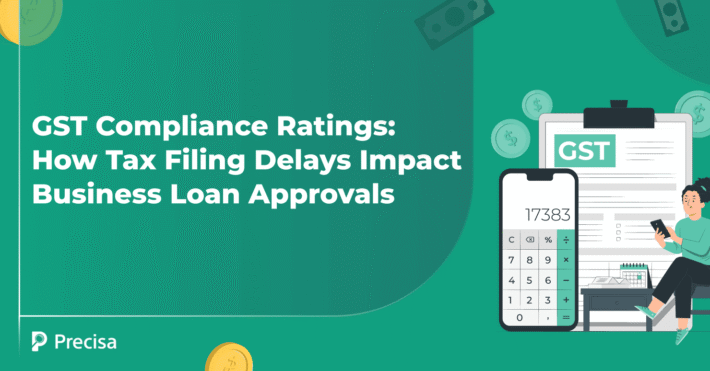Uncovering Hidden Risks: The Importance of Forensic Audits for Lenders

The increased complexity of financial fraud necessitates forensic audits. Instances like ₹7,800-crore Satyam scam and the ₹13,000-crore PNB fraud show how traditional audit methodologies fail to detect sophisticated deceptions.
RBI data shows that bank frauds aggregated to ₹30,252 crore in FY 2022-23, and roughly ₹28,792 crore involved are loan-related.
As businesses grow more sophisticated, so do financial deceptions. Traditional underwriting often misses subtle fraud indicators hidden in complex corporate structures and digital transactions.
The rise of layered transactions and innovative accounting manipulations demands a more rigorous approach – forensic auditing.
This article explores how forensic audits help lenders protect their interests in an increasingly complex financial landscape.
Understanding Forensic Audits in Lending
Forensic audits combine investigative methodologies with high-level accounting expertise to identify financial misconduct.
A conventional audit mainly looks at compliance checks and accuracy, whereas a forensic investigation looks deeper into any misrepresentation or manipulation done with regard to financial records.
For lenders, forensic audits serve as critical tools in risk assessment and fraud prevention. These specialised investigations help identify potential defaults before they occur, strengthen recovery proceedings, and protect institutional interests through comprehensive financial scrutiny.
5 Key Components of a Forensic Audit Framework
A robust forensic audit framework comprises several interconnected elements:
1. Financial Statement Analysis
Advanced analytics have transformed how forensic auditors examine financial statements. Modern analysis goes beyond surface-level reviews, scrutinising revenue recognition patterns, asset valuations, and related party transactions. This detailed examination often reveals window dressing, revenue manipulation, or hidden liabilities that traditional audits might overlook.
2. Transaction Pattern Analysis
Forensic auditors examine complex transaction chains, identifying round-trip transactions, shell company operations, and structured transactions designed to evade detection. This analysis becomes particularly crucial when evaluating high-value loan applications or investigating suspected defaults.
3. Document Verification
In line with digital lending guidelines, forensic audits employ advanced document verification techniques. It includes authentication of submitted documents, cross-verification with source records, and detailed analysis of digital footprints.
Forensic tools can detect document tampering, alterations, and forged signatures that might compromise lending decisions.
4. Business Operations Review
Forensic auditors evaluate physical business existence, analyse industry-standard ratios, and examine supplier and customer relationships.
This comprehensive review helps identify shell companies, front operations, or businesses created solely for fraudulent borrowing.
5. Management Assessment
Credit risk management includes a thorough evaluation of management integrity. Forensic auditors investigate the past business history, examine related party relationships, and analyse litigation history. This often reveals undisclosed conflicts of interest or past misconduct that could affect loan repayment.
Major Benefits of Forensic Audits for Lenders
Implementing forensic audits provides lending institutions with several benefits:
Enhanced Risk Detection
Early identification capabilities allow lenders to spot potential frauds before they materialise into significant losses. Detecting suspicious patterns in financial statements, transaction flows, or business operations enables preventive actions before loan disbursement, significantly reducing exposure to credit risk.
Stronger Legal Position
Forensic evidence strengthens legal proceedings in case of defaults or frauds. Detailed documentation, expert analysis, and comprehensive audit trails provide solid grounds for recovery proceedings, particularly valuable when dealing with willful defaults or fraudulent borrowers attempting to evade repayment obligations.
Portfolio Quality Improvement
Regular forensic reviews contribute significantly to maintaining healthy loan portfolios. By identifying and addressing risks early, lenders can prevent the concentration of high-risk assets and maintain better portfolio quality through informed lending decisions.
Regulatory Compliance
Forensic audits help meet regulatory requirements for due diligence and fraud prevention, ensuring compliance with RBI guidelines and other regulatory frameworks. This proactive approach helps avoid penalties and regulatory scrutiny.
Implementation Framework for Forensic Audits
Here are some important considerations for a successful forensic audit implementation:
Risk-Based Approach
Systematically approach forensic audits based on risk assessment. It shall include identifying high-risk sectors, clearly defined triggers for forensic investigation, and maintaining a complete audit trail. It must be robust enough to be flexible along shifting fraud patterns.
Technology Integration
Forensic audits rely heavily on advanced analytics and automation. Lenders must integrate data analytics tools, implement pattern recognition systems, and enable real-time monitoring capabilities. It helps process vast amounts of data quickly, identifying subtle patterns that might indicate fraudulent activity.
Expert Team Development
Success in forensic audits depends significantly on human expertise. Institutions must invest in training specialised staff, engaging experts, and maintaining strict investigation protocols. The team should have direct access to senior management, ensuring quick decision-making in critical cases.
5 Challenges in Forensic Audit Implementation
While forensic audits offer powerful risk detection capabilities, lenders face several significant challenges in their effective implementation:
1. Data Accessibility and Quality
Many businesses, especially in traditional sectors, maintain incomplete or inconsistent records. Digital data often exists across multiple platforms and formats, making consolidation and analysis complex and time-consuming.
2. Resource Constraints
Thorough forensic investigations require specialised expertise, advanced tools, and significant time investment. Small and medium-sized lenders often struggle to allocate adequate resources for comprehensive forensic audit programs, impacting the depth and effectiveness of investigations.
3. Complex Business Structures
Modern businesses operate through intricate networks of subsidiaries and associates. Tracing fund flows and identifying ultimate beneficiaries through these structures requires extensive investigation and expertise, often extending the audit timeline significantly.
4. Legal Framework Navigation
Forensic auditors must balance thorough investigation with legal compliance. The process involves navigating various legal frameworks while gathering evidence, requiring careful consideration to maintain the admissibility of evidence in legal proceedings.
5. Technology Integration Challenges
Many lenders operate on traditional platforms that may not readily support modern forensic tools. Integrating advanced analytics capabilities while maintaining existing operations requires significant technical expertise and investment, often creating operational disruptions.
Key Takeaway
Forensic audits have become indispensable for lenders in an era of sophisticated financial fraud.
As a cloud-based analytics platform, Precisa offers comprehensive solutions to strengthen forensic audit capabilities through integrated technology platforms.
Bank Statement Analysis provides deep insights into transaction patterns and potential fraud indicators. The GSTR Analysis tool verifies business authenticity and helps detect suspicious patterns in financial flows.
Through Account Aggregator Integration, lenders can access real-time, secure financial data for enhanced due diligence. The advanced analytics platform processes this information to generate comprehensive risk assessments and automated alerts for potential fraudulent activities.
The best part? Taking the first step with Precisa is entirely free!
Sign up now to get started.




